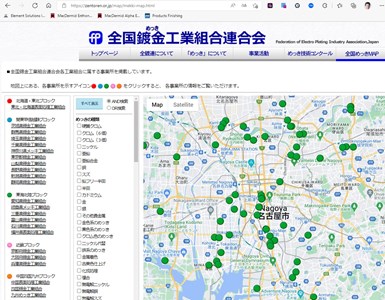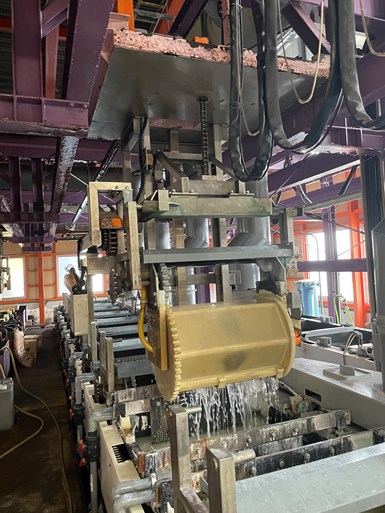Japanese Automotive Supply Chain Reliance on Plating Job Shops
[ad_1]

Taizo Suzuki introduces his barrel plating facility in Nagoya, Japan.
Image credit: All shots courtesy of MacDermid Enthone Industrial Alternatives.
A single of Japan’s tricks to its results in possessing a effectively-operate domestic automotive offer chain is the presence of readily obtainable plating career outlets that can function lock-in-stage with the Tier 1 and Tier 2 component makers demanding both anti-corrosion or ornamental plating. The plating occupation stores are contracted out to plate pieces on behalf of companies which do not have in-house plating functionality.
Manufacturers of automotive areas in Japan decide on to outsource surface area treatment for a wide range of explanations, such as the require to devote valuable manufacturing unit floor area to much more worth-extra functions or the lack of ability to draw in and keep plating engineers and other experts required to keep a defect-free of charge plating line. Platers are relentlessly changing their roles to continue to keep up with market variations, and their relevance in Japan’s automotive offer chain is a lot more critical now than at any time.

The trade business in Japan permits internet site viewers to search for platers dependent on location and plating style.
On-need delivery
According to the Federation of Electroplating Sector Affiliation in Japan, a whopping 1,350 plating career stores dot the industrial landscape in Japan. Thanks to the will need to provide just-in-time (JIT) shipping and delivery, huge concentrations of finishers pick to function in the vicinity of automotive shoppers in industrial clusters these types of as Gunma, Hiroshima, Nagoya, and Osaka. Position retailers running 24 hours a day normally make two deliveries for each day to significant shoppers, working with a “milk-run” shipping system which collects unplated components from and delivers plated sections to many shoppers in that area.
Lots of Tier 1s and Tier 2s employ a kanban stock product which specifies the specific time, down to the moment, when the plated elements should really be delivered by truck. Though JIT is really successful for these prospects, it can be inefficient for the truck motorists functioning for the platers, as they expertise idle time ready outside the house the customers’ vegetation just simply because it is as well quickly for the buyer to take the delivery.
Outsourcing non-main operations
For automotive component suppliers in Japan, maximizing flooring house utilization is really essential, so there is incredibly minimal room to store incoming components from platers. This lack of extra area creates a small business prospect for finishers, as a lot of suppliers use that important footprint to accomplish their core producing processes as a substitute of floor treatment method. As a consequence, plating is outsourced to nearby career stores, which gladly take this function considering the fact that it is core to their specialized organization.
Automotive areas manufacturers who do not outsource and alternatively carry out in-household plating say it is really difficult to recruit engineers and other industry experts specialized in surface area therapy considering the fact that the expertise is often captivated to the main manufacturing procedures of people businesses and due to the declining figures of younger grownups getting into Japan’s workforce. Instruction is also a problem for makers with captive plating functions since of the prolonged time demanded to learn how metallic or plastic components are floor-taken care of. At plating occupation retailers, even so, several professionals are ready to act as academics, and that know-how is thoroughly passed down from generation to technology.
Strategic development
Of the thousand-some job shops in Japan, the mind-boggling bulk are “mom-and-pop” factories with just 10-30 workforce just about every, resulting in a pretty fragmented marketplace with a lot of modest opponents. The surface area treatment industry in Japan has not still seen the consolidation of companies via M&A, but that might adjust in the foreseeable future.
As a substitute of buying opponents, some platers opt for to broaden their small business by entering adjacent industries this kind of as coating. The approach involving paint, regardless of whether liquid or powder, is one more case in point of a non-main approach that companies frequently want to outsource, and it could dovetail nicely with the method of a finisher. Other work retailers specializing in plating on plastic have invested in injection molding to give a one-stop support for customers producing doorway handles, automobile emblems, and other small attractive areas.
Whilst geographic enlargement in Japan is not so prevalent for platers, in recent yrs, there have been quite a few occupation stores that have decided to establish plating-focused factories in China, Indonesia, Mexico, Thailand, Vietnam, and other nations which are property to Japanese automotive transplants. A lot of of these task retailers had been at first asked for by their clients in Japan to look at overseas growth. In some cases, the Japanese career store operates a turnkey procedure inside their customer’s abroad facility and manages the plating line on the manufacturer’s behalf.

This completely-automated line allows the corporation to retain its headcount at just 10 employees.
Vital purpose in supply chain
1 plater with a successful company design is Suzuki Mekki Kogyo K.K., which specializes in zinc and tin-zinc alloy plating solutions for compact stamped parts. From their place in Nagoya, this household-owned business enterprise has been providing to beneath-the-hood areas producers who demand a remarkable corrosion-resistant surface area treatment method considering the fact that 1964. “We are ready to meet the exacting requirements of our prospects and supply a quick turnaround in 48 hours,” states Taizo Suzuki, who has served as President and Consultant Director since using about his father’s enterprise in 1986 at the age of 31.
Suzuki Mekki’s entirely-automatic barrel line, mounted in 2011 in a manufacturer-new facility, allows them to function the entire business proficiently with a full of just 10 personnel. Deliveries to consumers, all positioned in a radius of 30 miles, are outsourced to a 3rd-party logistics company. “We earlier plated several cigarette ashtrays for automobiles, applied in both of those the front and rear passenger compartments, but life-style variations have built this kind of fixtures out of date,” reminisces Suzuki. Despite the adjustments in the automotive business, 70% of Suzuki Mekki’s profits is however associated in some variety or one more to vehicles. Taizo Suzuki says that the modern recognition of hybrid vehicles in Japan has been a boon to his company, because of to the proliferation of considerably smaller sized parts which are optimum for barrel plating.
The future is shiny
In the long term, further more electrification of automobiles and stricter environmental regulations will pose extra difficulties to finishers in Japan, but these problems current possibilities to those people who are capable to adapt their organization product. For instance, the automotive lightweighting developments intensify the industry’s will need to uncover platers who can surface area treat aluminum. These platers are utilizing their compact company sizing to their advantage by becoming quite nimble and acquiring more techniques to make improvements to their value proposition to shoppers. While the skill to appeal to expertise to the industry is increasingly complicated and altering demographic trends in Japan are alarming, the new reshoring of creation back to Japan will only reward the country’s task outlets in the potential.
About the Writer

Julian Bashore
Julian Bashore, based in Tokyo, is Normal Manager of the MacDermid Enthone Industrial Answers corporations positioned in Indonesia, Japan and Thailand. He also manages the Circuitry Alternatives business enterprise in Japan, and is a perfectly-recognized figure in the printed circuit board business exactly where he has served on the board of the Japan Electronics Packaging and Circuits Affiliation considering that 2015. In advance of joining the plating industry in 2013, his occupation has been mainly centered in coatings and other floor treatment chemicals for the two plastics and metals made use of in the automotive business. Alongside the way, he also labored for a career store which specializes in warmth cure and other metallurgical companies.
[ad_2]
Resource hyperlink






